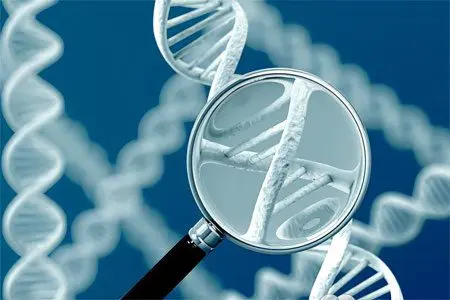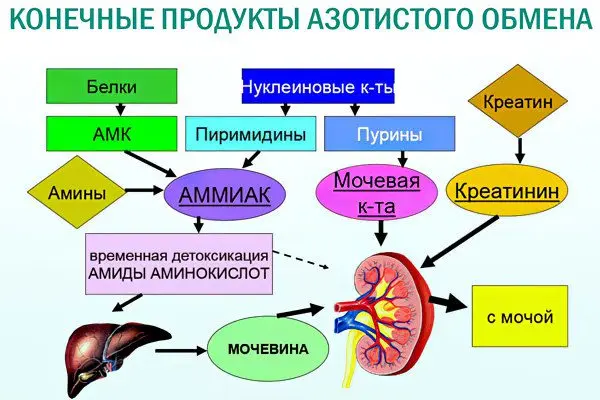Contents

Human blood has a complex composition, each of its structural units is responsible for many functions. By determining the level of blood components, it is possible to draw a conclusion about the state of human health. By the quantitative value of each element of the blood, one can judge the work of a particular organ or system. The article will focus on urea.
Why does the body produce urea?

During the breakdown of proteins, energy is released, which the body spends on meeting its own needs.
Therefore, the body has protective mechanisms aimed at neutralizing ammonia and its excretion. The process of neutralization and purification from ammonia is quite complicated and is accompanied by multiple chemical reactions. Their result is the formation of urea, which acts as the end product of nitrogen metabolism.
The organ responsible for the formation of urea is the liver. From it, it enters the bloodstream, reaches the kidneys, in which it is filtered and excreted from the body along with urine.

Indicators of the norm
The level of urea in the blood is an important indicator by which we can conclude that the following organs are working correctly:
Kidney.
Liver.
Norm indicators:
Age gender | Reference values | |
1,8 – 6 mmol / l | ||
4 – 14 years | 2,5 – 6 mmol / l | |
14-20 years | 2,9 – 7,5 mmol / l | |
20 – 50 years | male | 3,2 – 7,3 mmol / l |
female | 2,6 – 6,7 mmol / l | |
> 50 years | male | 3 – 9,2 mmol / l |
female | 3,5 – 7,2 mmol / l | |
An increase in the level of urea in the blood with age is considered by experts as a variant of the norm. This is due to the fact that in people over 60 years of age, the quality of kidney functioning decreases, they filter urine worse, which leads to an increase in the concentration of urea in the general bloodstream. According to statistics, this figure is higher for men than for women.
Causes of low blood urea
Urea in the blood is extremely rare. But if the analysis reveals a deviation, it is necessary to find out the reason.
Causes of low blood urea levels:
Inflammation of the liver caused by alcohol abuse or hepatitis viruses.
Cirrhosis.
Hepatosis.
Liver failure.
Pancreatitis.
Genetic disorders in the production of enzymes necessary for the normal formation of urea.
Parasite infestation.
Complications after surgery.
nephrotic syndrome.
Intoxication of the body with poisons.
Hyperhydration.
Neoplasms of the liver.
Sometimes a decrease in the level of urea in the blood occurs against the background of positive changes in the body. This condition is pregnancy. After conception, the work of all systems is restructured, they adapt to meet the needs of the fetus. The body intensively synthesizes protein, which leads to some decrease in the level of urea.
The nature of the food matters. If a person follows a low-protein diet or avoids animal products altogether, blood urea levels will be reduced. This is not a cause for concern. However, care must be taken to ensure that the indicators do not reach critical levels.
Why does the child have a low urea level?
In children of the first years of life, a urea level of 1,2 mmol / l can be considered a variant of the norm. This is due to the fact that the body spends the consumed protein on growth and development, its colossal part goes to the formation of tissues.
However, in newborns, the level of urea in the blood may, on the contrary, be increased. This is due to the fact that immediately after birth, the level of fluid in the body is reduced. As the water balance is restored, urea indicators will return to normal. This happens within the first 7 days after the baby is born.
Symptoms of low urea

If urea is lowered in the blood, then this condition is far from always possible to identify on its own. Symptoms that occur, people most often correlate with other causes.
However, there are signs that should alert a person and make him turn to a specialist:
Decreased performance.
Lack of appetite.
Flatulence.
Pain in right side under ribs.
Weight loss.
Weakness of the muscular system.
Puffiness
Finding the problem is easy. To determine the quantitative content of urea, it is enough to donate blood for biochemical analysis.
Treatment
Treatment should be aimed at eliminating the cause that led to a decrease in the level of urea in the blood. If it comes down to dieting or pregnancy, then therapy is not prescribed, since this is a variant of the norm. However, careful monitoring of the amount of protein food that a person consumes is required.
To begin with, the patient must consult a therapist. In the future, he may need to consult a urologist or hepatologist. The doctor will prescribe additional tests, recommend an instrumental diagnosis of the liver and kidneys.
Treatment can be carried out in the following areas:
Restoration of the function of the hepatobiliary system.
Normalization of the digestive system.
Correction of metabolic processes.
Removal of intoxication from the body.
Treatment should be done by a doctor. Self-therapy is unacceptable, since only a qualitative preliminary examination is a prerequisite for the successful correction of the level of urea in the blood.









